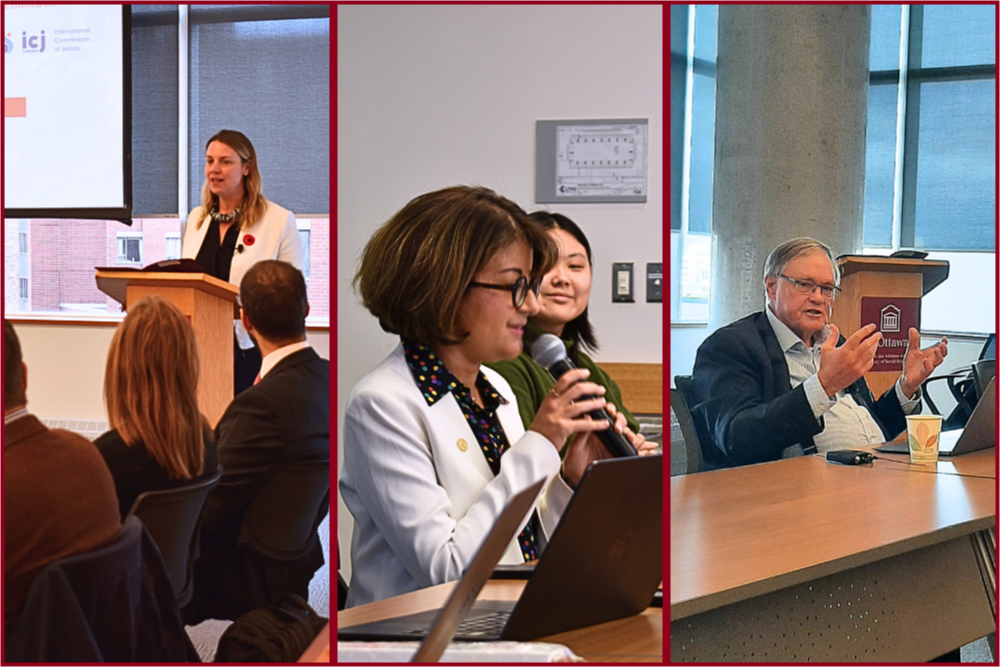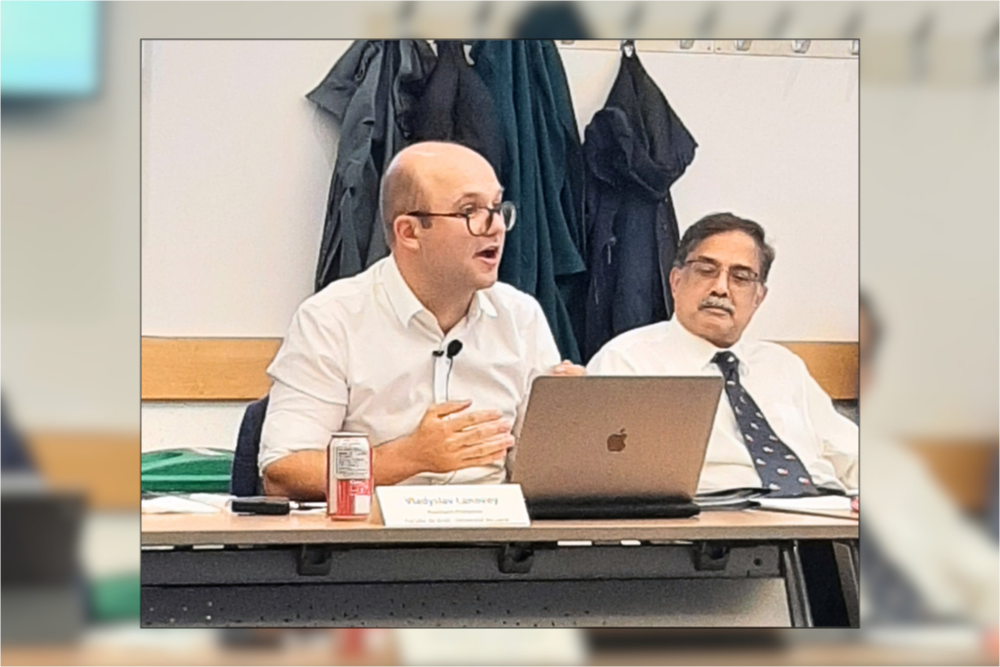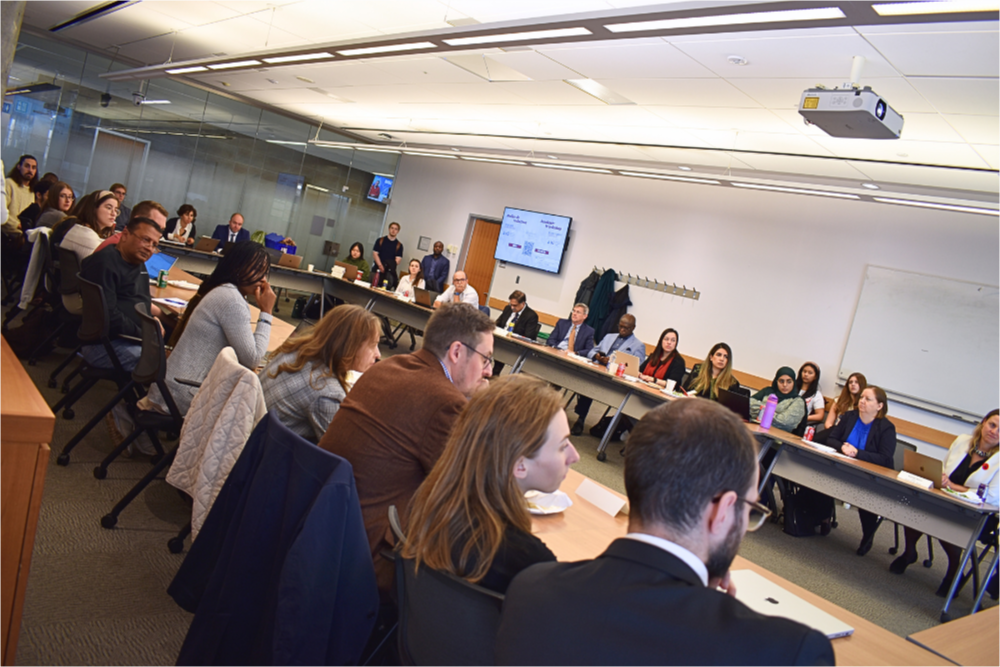Jointly organized by the Canadian Yearbook of International Law (CYIL), the University of Ottawa’s International Law Group, and the Canadian Section of the International Commission of Jurists (ICJ), the workshop brought together early-career, mid-career, and senior academics to exchange ideas and provide constructive feedback on developing research. This collaborative initiative is tied to the upcoming CYIL special issue, “Canada Before International Courts and Tribunals.” The event highlighted the Faculty’s strength in International Law and its commitment to fostering collaborative scholarship and building a community of practice in this area.

“The significance of this gathering cannot be overstated. It provides a unique opportunity for our emerging scholars to present and receive invaluable feedback from seasoned experts & senior scholars.”
Kristen Boon
— The Susan & Perry Dellelce Dean, Common Law Section
In her capacity as Editor-in-Chief of the Yearbook, Dean Kristen Boon welcomed attendees and underscored the importance of intellectual collaboration in fostering the dynamic exchange of perspectives
“This workshop is a celebration of the CYIL, and of the quality of the academic discourse it offers, from a distinctively Canadian perspective,” stated Dean Boon. “We hope it will also bring new authors to publish in the CYIL, further cementing the bridge between emerging scholars and established scholarship.”
The workshop was spearheaded by Professor Roojin Habibi together with CYIL coordinator and alum Nickolas Eburne, LLL ‘21, JD ‘22 & LLM ‘24. Professor Habibi emphasized the dedication and rigor of the scholars. “We were honoured to gather this community of scholars and practitioners whose works - individually and collectively - were of such high caliber”
A highlight of the event was a keynote address by uOttawa Emeritus Professor and former Editor-in-Chief of the CYIL, Donald M. McRae, who reflected on Canada’s early engagement with the International Court of Justice. Professor McRae’s address provided both a retrospective and forward-looking perspective on Canada’s evolving role in the international legal arena. His talk set the stage for a full day of research presentations, each examining Canada’s influence on international law from various angles.

Perspectives on Canada’s role in international courts and tribunals
Following the keynote, six presenters introduced their research on topics ranging from state immunity to investment treaty arbitration. These papers-in-progress, presented in both English and French, offered timely insights into Canada’s engagement with international law.
The first presentation, Canada’s Legacy at the International Court of Justice, was delivered by Vladyslav Lanovoy, Assistant Professor at Université Laval, who spoke on behalf of co-author uOttawa Professor Céline Braumann. Their paper, which sparked a lively discussion among attendees, explores Canada’s role in shaping the modern system of international dispute resolution, with a particular focus on the International Court of Justice (ICJ).

William S. Dodge, Lobingier Professor of Comparative Law at George Washington University, followed with his paper, Why Terrorism Exceptions to State Immunity Do Not Violate International Law. His analysis shed light on common, yet-incorrect assumptions about state-supported terrorism and highlighted that Canada’s terrorism exception aligns with international law.
David Pavot, Professor of International Law at Université de Sherbrooke, offered his insights on Canada’s involvement in a recent case, Violations alléguées des immunités de l’État (République islamique d’Iran c. Canada) (Alleged Violations of State Immunities (Islamic Republic of Iran v. Canada). The presentation explored Canada’s stance in this high-profile dispute about terrorism exceptions to foreign sovereign immunity.
The workshop continued with Steven Tiwa Fomekong, Assistant Professor at Université Laval, presenting his paper, L’Affaire Canada et Pays-Bas c. Syrie devant la Cour internationale de Justice, which examines how the ICJ case brought by Canada and the Netherlands' against Syria, alleging that Syria was in violation of the Convention against torture and other cruel, inhuman or degrading treatment or punishment (1984), could have been an opportunity to address violations of international humanitarian law (IHL) in Syria as well. The article explores the legal challenges that prevented IHL from being directly addressed in this case and suggests other ways to support respect for IHL in Syria.
Gaëlle Foucault, a PhD candidate at Université de Montréal, contributed with her presentation, Un mandat pour la Cour internationale de Justice en Syrie, which explored the ICJ’s critical role in addressing state responsibility. Her research also raises the possibility of closer collaboration between the ICJ and the International Criminal Court (ICC) in tackling state in addressing human rights abuses.
The final presentation, by Jean-Michel Marcoux, Assistant Professor at Carleton University, was titled A Meaningful Distinction? ‘Legitimate Objectives’ in Canadian Investment Treaties and their consideration by investor-state dispute settlement tribunals. His paper outlines Canada’s introduction of the word “legitimate” in several new legal terms, such as “legitimate public welfare objectives”, to allow regulatory flexibility. The article examines how these overlapping terms might impact the interpretation of international investment obligations and argues that they don’t represent legally distinct concepts and may lead to unintended consequences.

This rich day of presentations, discussions, and debates highlighted the multifaceted role Canada plays in shaping international law. The workshop proved to be an excellent platform to exchange ideas, advance scholarship, and inspire innovative solutions. Our Faculty is committed to contributing to a robust community of experts dedicated to addressing global challenges and to advancing international legal discourse in Canada. Through initiatives like these, we aim to create a dynamic hub where thought leadership and collaboration thrive, driving progress and positioning Canada at the forefront of international law.
We look forward to future opportunities to bring together legal minds from across the globe, strengthening Canada’s contributions to international law and ensuring that future legal debates are informed, inclusive, and impactful.
